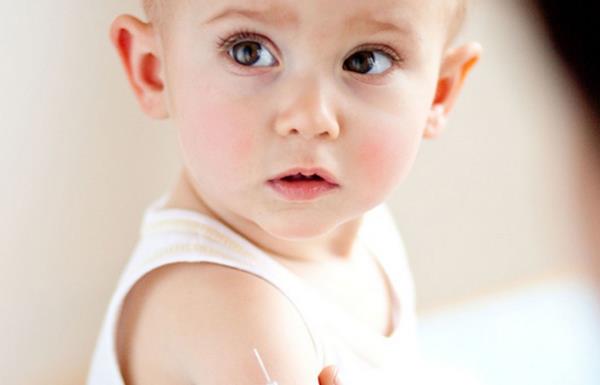After the measles vaccination, your baby may have a fever and a mild rash. Tuberculosis vaccination can cause swollen glands in the armpit. Is there any more reaction? Find out now mom
In addition to preventing and protecting your child from serious illnesses, vaccination may come with a few "side effects". This makes many mothers feel worried. So, what are these side effects like? Affecting the baby like? Will there be an effect on the preventive effect of vaccines? Do not miss the following information!

Find out the side effects after vaccination for your baby to help mothers protect their children better
1 / Reaction at the injection site
Pain at the injection site is the most common reaction. Your baby may be in pain for a few hours after that. Even a baby is in pain for up to 1 day and doesn't stop crying. In some cases, your baby may experience a pea-sized lump in 2-3 weeks or an itch for 3-6 days. Usually, these reactions go away on their own and only 5-10% of children experience the condition.
2 / Children have a fever when vaccinated
Fever is also a common reaction after vaccination, especially the typhoid and pertussis shots. Measles and mumps vaccination can also cause a fever, but usually occurs slowly, 5-12 days later. However, most vaccination fevers go away on their own after 1-2 days.
3 / Skin reactions
2-10% of children, after being vaccinated against measles, rubela may develop a mild fever with typhus fever, the symptoms are similar to measles but milder. For babies with a history of allergy, they can develop urticaria, itching all over the body in 3-6 days.
4 / Convulsions after vaccination for children
After a pertussis shot, some children show high fever with seizures. 0.6% of children have this condition, and most have a history of seizures, epilepsy. Therefore, in some countries, babies with epilepsy are often listed as "contraindications" to the pertussis vaccination. Some dangerous cases can lead to coma, brain disease or some sequelae later. However, this rate is often very rare.
5 / The "groan" syndrome
Due to the influence of the drug on the nerves, about 3% of infants from 3-6 months old show whining and fussing continuously for many hours after vaccination. Even doctors have to use sedatives so that the baby can sleep quietly. However, the majority of these cases usually do not cause dangerous complications.
6 / Lymphadenitis
According to statistics, 6 to 12% of children after being vaccinated with tuberculosis develop lymphadenitis in the armpit, the side that was vaccinated. There are 2 types of lymphadenitis: monotonic and purulent lymphadenitis, which usually appear 3-5 weeks after vaccination.
Single lymphadenitis is a large, pea-sized swollen lymph node that is slightly stiff but has no pus inside. Single lymphadenitis usually lasts about 1 month and goes away on its own. Purulent lymphadenitis is also a swollen lymph node. However, due to the contents of pus inside, the lymph nodes are usually swollen gradually, possibly even as large as a lemon. In some cases, the purulent ganglion can rupture on its own, exposing the cap. Some other cases may require surgical intervention.

Child vaccinations: The shots are indispensable! Infants with poor resistance are very susceptible to infectious diseases, and vaccination is the safest way to protect them. Immunizations help prevent the spread of disease and help protect children and babies from dangerous complications. Right now, vaccinations can protect babies against 12 diseases ...













